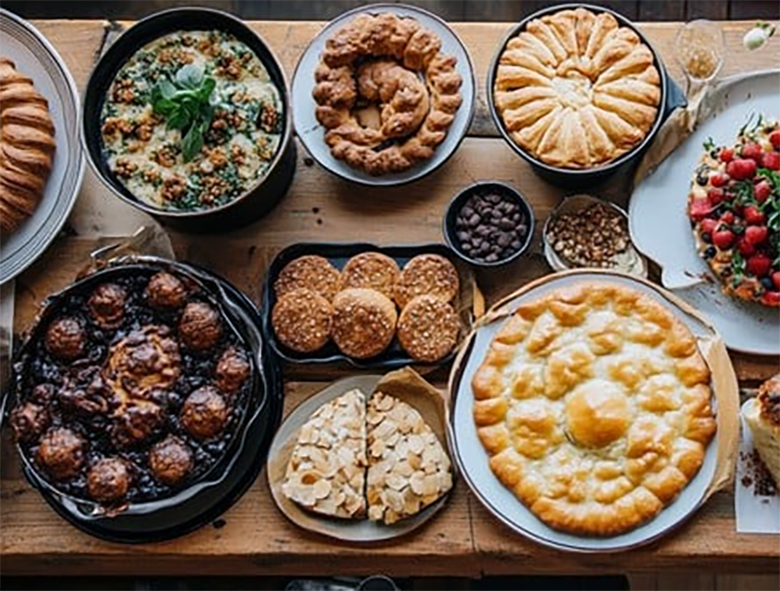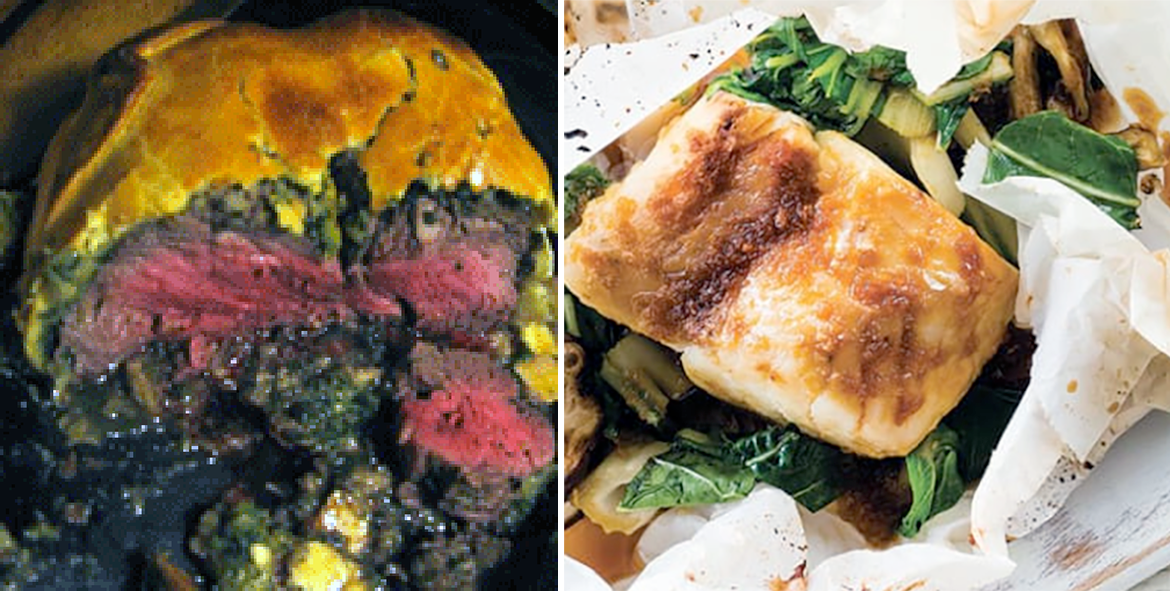FabulousFusionFood's Baking Recipes 19th Page
 A range of baked goods.
A range of baked goods.
Welcome to FabulousFusionFood's Baking Recipes Page — This is a continuation of an entire series of pages that will, I hope, allow my visitors to better navigate this site. As well as displaying recipes by name, country and region of origin I am now planning a whole series of pages where recipes can be located by meal type and main ingredient. This page gives a listing of all the baking recipes added to this site. Baking is defined as a technique for the prolonged cooking of food using dry heat by the action of conduction. Baking is normally done in an oven, but goods may also be baked in hot ashes or on hot stones. Baking differs from Roasting Recipes in that a lower temperature is typically used and the items are cooked for a longer period of time. Baking is a much older process than most people think and foods were probably originally baked in embers or with hot stones (which is how bread may have started). Only later did specialist ovens develop. Though most baked goods tend to be bread or cake-based some other dishes such as pasta dishes and vegetable dishes may also be baked. Stews are often also technically baked in an oven, but are not classed as 'baked goods' in that they are more liquid than solid at the end of the cooking process.
Baking is a method of preparing food that uses dry heat, typically in an oven, but can also be done in hot ashes, or on hot stones. The most common baked item is bread, but many other types of foods can be baked. Heat is gradually transferred "from the surface of cakes, biscuits and cookies, and pieces of bread to their centre, typically conducted at elevated temperatures surpassing 150°C. Dry heat cooking imparts a distinctive richness to foods through the processes of caramelization and surface browning. As heat travels through, it transforms batters and doughs into baked goods and more with a firm dry crust and a softer centre. Baking can be combined with grilling to produce a hybrid barbecue variant by using both methods simultaneously, or one after the other. Baking is related to barbecuing because the concept of the masonry oven is similar to that of a smoke pit.
In addition to bread, baking is used to prepare cakes, pastries, pies, tarts, quiches, biscuits and cookies, scones, crackers, pretzels, and more. These popular items are known collectively as 'baked goods', and are often sold at a bakery, which is a store that carries only baked goods, or at markets, grocery stores, farmers markets or through other venues.
 Beef en croûte (left) and fish en papillote (right).
Beef en croûte (left) and fish en papillote (right).
The alphabetical list of all the baking recipes on this site follows, (limited to 100 recipes per page). There are 2752 recipes in total:
Page 19 of 28
| Pargo con Tomate (Snapper with Tomato) Origin: Colombia | Pastai Cig Llo (Veal Pie) Origin: Welsh | Pastiera Napoletana (Naples Easter Cakes) Origin: Italy |
| Parkin Origin: England | Pastai Cig oen Cymraeg a Phwmpen (Welsh Lamb and Marrow Pie) Origin: Welsh | Pastilla (Moroccan Meat Pie) Origin: Morocco |
| Parkin Origin: England | Pastai Cocos (Cockle Pie) Origin: Welsh | Pastilla au Poulet (Chicklen Pastilla) Origin: Morocco |
| Parmentier de Canard (Duck Parmentier) Origin: France | Pastai Cocos, Tatws a Chennin (Cockle, Potato and Leek Pie) Origin: Welsh | Pastizzi ta' l-Incov (Anchovy Pastizzi) Origin: Malta |
| Parseli Brithyll a Thatws Cynnar (Trout and New Potato Parcels) Origin: Welsh | Pastai Cwnhingen (Rabbit Pie) Origin: Welsh | Pastizzi tal Pizelli (Pea Pastizzi) Origin: Malta |
| Parseli Cennin (Leek Parcels) Origin: Welsh | Pastai Cymreig Cocos a Chennin (Welsh Cockle and Leek Pie) Origin: Welsh | Pastry Cheesecake Crust Origin: Britain |
| Parseli Ffilo Cennin a Chaws Caerffili (Leek and Caerphilly Cheese Parcels) Origin: Welsh | Pastai Draig Gymreig Porc, Cennin a Chwmin (Pork, Leek and Cumin Welsh Dragon Pie) Origin: Welsh | Pâte à Choux (Choux Pastry) Origin: France |
| Parsley Pasty Origin: England | Pastai Gocos (Cockle Pie) Origin: Welsh | Pâté breton (Breton Pâté) Origin: France |
| Party Cupcakes Origin: Britain | Pastai Katt (Katt Pie) Origin: Welsh | Pâte Feuilletée (Puff Pastry) Origin: France |
| Pasca de Pasti (Romanian Easter Cheesecake) Origin: Romania | Pastai Mam (Mum's White Pastry) Origin: Welsh | Patellam tyrotaricham ex quocumque salso volueris (A Dish of Cheese and Whichever Salt Fish you Wish) Origin: Roman |
| Paska Babka (Russian Easter Bread) Origin: Russia | Pastai Nadolig Eidion a Chlementin (Christmas Beef and Clementine Pie) Origin: Welsh | Pâtés à la Goyave (Guava Pasties) Origin: Martinique |
| Paska Babka (Easter Babka) Origin: Belarus | Pastai Nos Priodas (Wedding Night Pie) Origin: Welsh | Patina de Cucurbitis (A Dish of Melon) Origin: Roman |
| Paska Babka (Easter Babka) Origin: Russia | Pastai Oen Cymreig (Welsh Lamb Pie) Origin: Welsh | Patina de Pisce Lupo (A Dish of Service-berries) Origin: Roman |
| Paska Babka (Easter Babka) Origin: Ukraine | Pastai Penfro (Pembrokeshire Pies) Origin: Welsh | Patina Fusilis (A Dish of Cold Asparagus) Origin: Roman |
| Paska Bobka (Polish Easter Bread) Origin: Poland | Pastai Pysgotwr (Fisherman's Pie) Origin: Welsh | Patina Urticarum (A Dish of Stinging Nettles) Origin: Roman |
| Paska Slovak (Slovakian Easter Bread) Origin: Slovakia | Pastai Tatws (Potato Pie) Origin: Welsh | Patinam de rosis (A dish of roses) Origin: Roman |
| Paskalya �°C7;öreği (Turkish Easter Bread) Origin: Turkey | Pastai Ystumllwynarth (Oystermouth Pie) Origin: Welsh | Patychyk (Breaded Kebabs) Origin: Ukraine |
| Passion Cake Origin: Britain | Pastai'r Bwthyn (Cottage-style Pie) Origin: Welsh | Pavlova Origin: New Zealand |
| Passion Fruit and Orange Butterfly Cakes Origin: Britain | Pastei Arennau ac Eidion (Steak and Kidney Pie) Origin: Welsh | Payne Foundow (Medieval Bread Pudding) Origin: England |
| Passion Fruit Pie Origin: Norfolk Island | Pastei Bersli (Parsley Pie) Origin: Welsh | Pea Flour Bread Origin: British |
| Passion Fruit Soufflé Origin: Britain | Pastei'r Porthmon (Drover's Pie) Origin: Welsh | Peanut Butter Cheesecake Origin: Britain |
| Passionfruit Crème Patissière Origin: Saint Barthelemy | Pastel de Belém Origin: Portugal | Peanut Clusters Origin: Britain |
| Pastéis de nata (Cream Custards) Origin: Portugal | Pastel de Choclo Origin: Chile | Peanut Cookies Origin: Britain |
| Pastéis de nata (Cream Custards) Origin: Cape Verde | Pastel de Jamón (Ham Cakes) Origin: Peru | Peanut Macaroons Origin: Sudan-a |
| Pastéis de nata (Cream Custards) Origin: East Timor | Pastel de Papas con Tres Quesos (Potato Cake with Three Cheeses) Origin: Peru | Pear and Apple Ginger Galette Origin: America |
| Pastéis de nata (Cream Custards) Origin: Mozambique | Pastelillos de Guayaba (Guava Pastries) Origin: Puerto Rico | Pear and Blackberry Cobbler Origin: Britain |
| Pastéis de nata (Cream Custards) Origin: South Africa | Pastelitos de yuca con atún (Cassava and Tuna Pies) Origin: Colombia | Pease Bannocks Origin: Scotland |
| Pasta Frolla Origin: Italy | Pastelón (Sweet Plantain Lasagna) Origin: Puerto Rico | Pecan Brie Tarts Origin: British |
| Pastai Briwgig a Llugaeorn (Pork Mince and Cranberry Mini Pies) Origin: Welsh | Pastelón de Arroz (Cheesy Beef and Rice Casserole) Origin: Dominican Republic | Pehtranova Potica (Tarragon Potica) Origin: Slovenia |
| Pastai Briwgig Eidion a Nionod (Welsh Beef Mince and Onion Pies) Origin: Welsh | Pastelón de Harina de Maíz (Cornmeal and Beef Casserole) Origin: Dominican Republic | Pennywise Fruit Cake Origin: British |
| Pastai Briwgig Eidion a Nionod (Leek and Caerphilly Cheese Crumble Tart) Origin: Welsh | Pastelón de Papa (Dominican Cottage Pie) Origin: Dominican Republic | Penzance Cake Origin: England |
| Pastai Cenin, Panas a Chig Moch (Leek, Parsnip and Bacon Pie) Origin: Welsh | Pastes hern lagesek (Stargazy Pie) Origin: England | Penzance Cake II Origin: England |
| Pastai Cennin (Leek Pasty) Origin: Welsh | Pastes hern lagesek (Stargazy Pie) Origin: England | |
| Pastai Cig Carw (Venison Pie) Origin: Welsh | Pastiera di Grano (Neapolitan Grain Pie) Origin: Italy |
Page 19 of 28